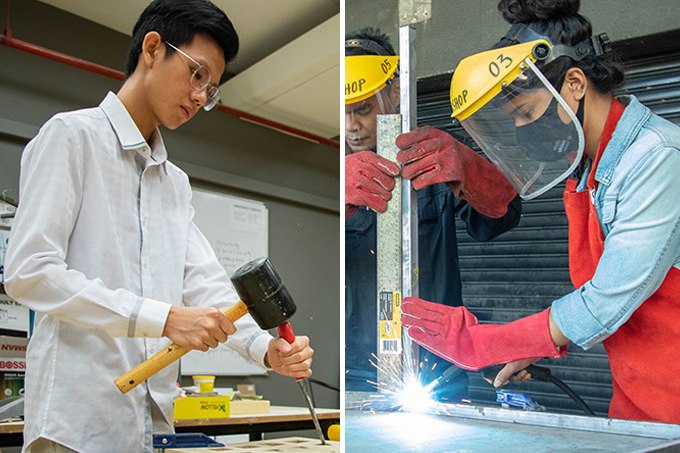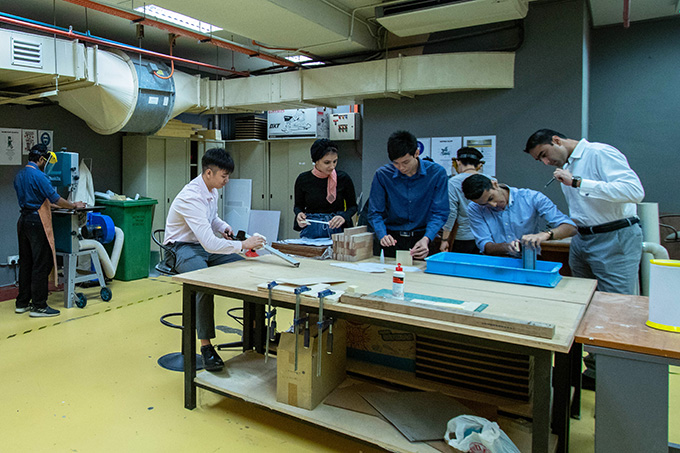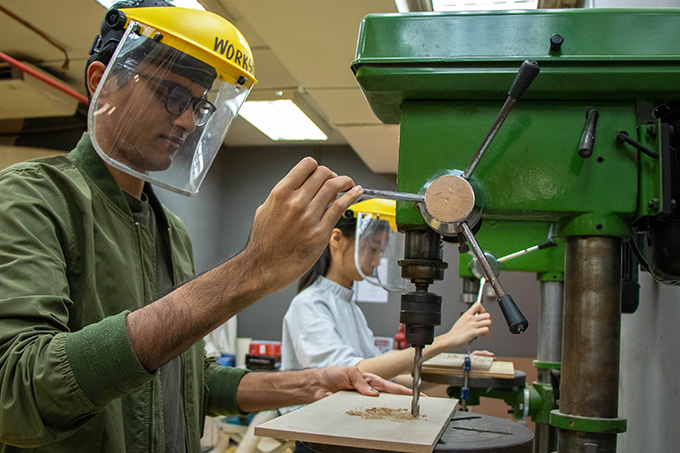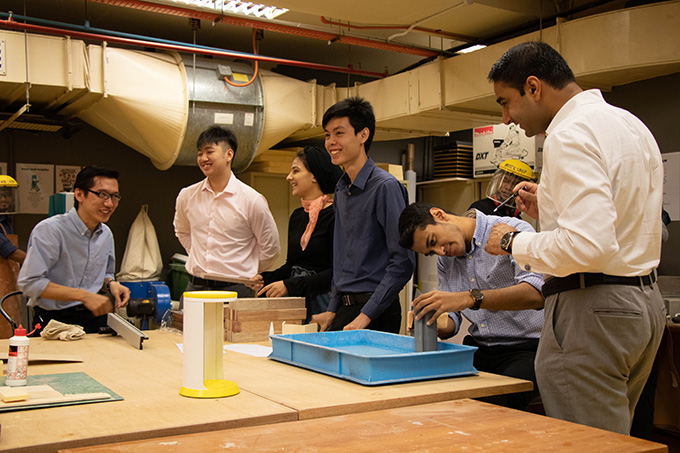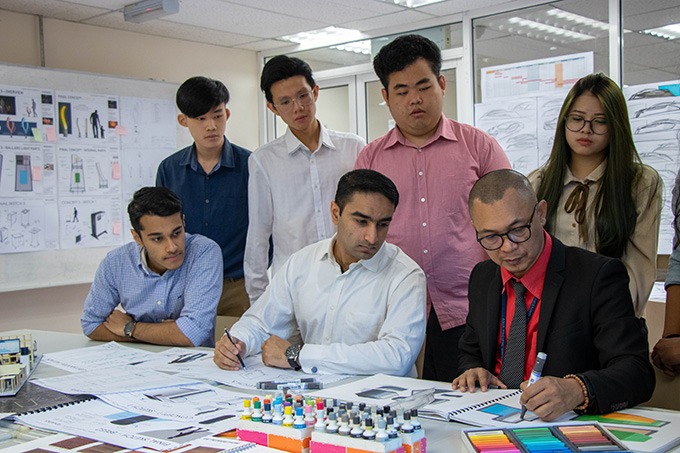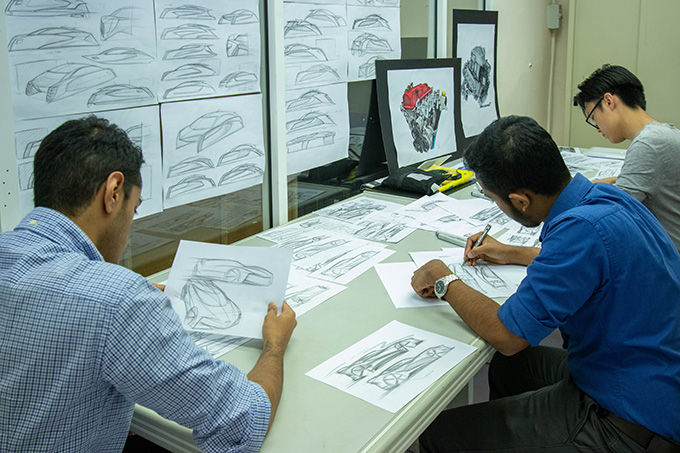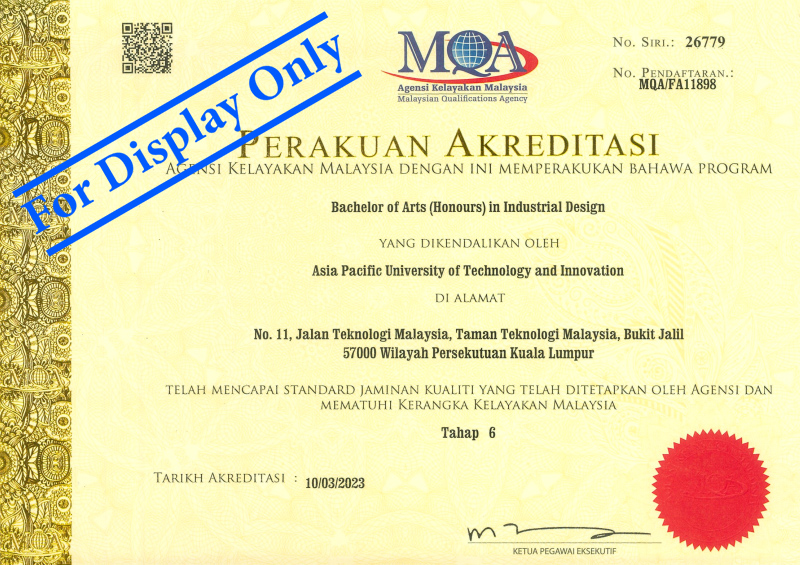You are here
Bachelor of Arts (Honours) in Industrial Design
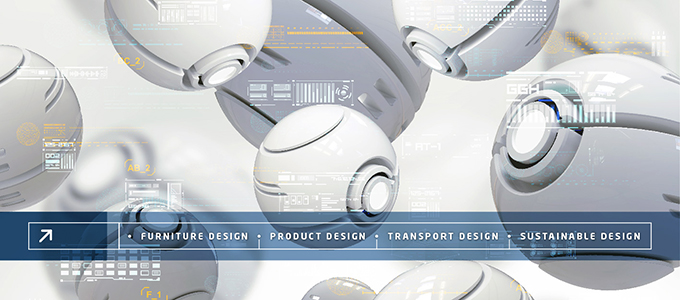
| |||||
APU-DMU DUAL DEGREE PROGRAMME
| |||||
Malaysia’s First and Only University Recognised by the WDO
APU is proud to be Malaysia’s ONLY university recognised as a member of the prestigious World Design Organisation (WDO), an international network of over 200 universities, organisations, and designers from various countries like the United Kingdom, Australia, USA, New Zealand, and more.
This exclusive membership connects APU students to the global design community, offering international insights and opportunities to work on impactful, innovative projects. Discover the full list of members here.
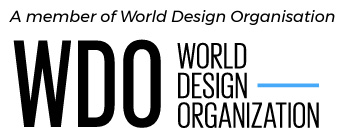
ADMISSION REQUIREMENTS
| GENERAL REQUIREMENTS | |
| DIRECT ENTRY TO LEVEL 1 OF THE DEGREE: | |
| STPM | • A Pass in STPM with a minimum Grade C (GP 2.00) in any 2 subjects and a Credit in Bahasa Melayu and a Pass in English at SPM level. |
| A-LEVEL | • 2 Passes (Grade A-D) in A-Level with a Pass in English at SPM/O-Level/IGCSE or its equivalent. |
| UEC | • 5 Grade B’s in UEC. |
| MATRICULATION/ FOUNDATION | • A Pass in Matriculation or Foundation studies with minimum CGPA of 2.00. |
Note: Pass an Interview OR submission of Design Portfolio as required. | |
| DIRECT ENTRY TO LEVEL 2 OF THE DEGREE: | |
| RELATED DIPLOMA | • A Diploma in Design & Media or equivalent with a minimum CGPA of 2.00
|
Equivalent qualification and / or experience which is recognised by the Senate / institution.
Note: The above entry requirements may differ for specific programmes based on the latest programme standards published by Malaysian Qualifications Agency (MQA). The qualification and entry requirements for the programmes will be determined based on the "Comparison List of Equivalency of International Qualifications with SPM (O-Levels equivalent) and STPM (A-Levels equivalent)" published by Malaysian Qualifications Agency (MQA).
| ENGLISH REQUIREMENTS | |
INTERNATIONAL STUDENTS | • IELTS : 5.0 |
Portfolio & Interview Guide For Application Into APU Design Programmes |
Application Process
As part of the entry requirements into the APU Design Degrees, it is mandatory for the applicant to submit either one of the following for evaluation together with complete educational documents:
• Portfolio Submission
• Interview
AREAS OF INTEREST
|
|
PROGRAMME DESCRIPTION
If architects design the house, then industrial designers design everything inside.
Industrial Design is the professional practice of designing products used by millions of people around the world every day. Industrial designers focus on the product’s appearance and value on top of how it’s manufactured and user experience. Every product you have and interact in your home is the result of a design process and thousands of decisions aimed at improving your life through design.
In professional practice, industrial designers are often part of multidisciplinary teams where everyone works together towards a common goal. This team is made up of strategists, engineers, user interface (UI) designers, project managers, branding experts, graphic designers,customers and manufacturer. The collaboration of so many different perspectives allows the design team to understand a problem to the fullest extent, then craft a solution that skillfully responds to the unique needs of a user.
Industrial designers develop the concepts for manufactured products, furniture, such as cars, home appliances, and toys. They combine art, business, and engineering to make products that people use every day. Industrial designers consider the function, aesthetics, production costs, and usability of products when developing new product concept.
In the first and second year, student will be exposed to various skills from manual sketching, digital sketching to model making, realising their concept design into reality. Besides that, they will be exposed to various theories and knowledge that are essential in the world of Industrial Design. The student will be able to focus on an area of interest (Product Design/Transport Design/ Furniture Design/ Sustainable Design) determined by their option.
PROGRAMME OUTLINE
This programme is specifically designed to provide students with:
- A holistic experience in the field of industrial design. Industrial designers focus on the product’s appearance and value on top of how it functions, how it’s manufactured and user experience.
DEGREE LEVEL 1 |
First-year students will be focusing on the fundamentals of industrial design which includes drawing, creative thinking, project management, design process and model making. Student will be exposed to various skills from manual & digital sketching, brain storming methods to model making realising their concept design into reality. Students will be working in team managing projects, handling restricted timeline, develop communication skills as well as entrepreneurial skills.
CORE MODULES | |
|
|
ELECTIVE MODULES | |
|
|
DEGREE LEVEL 2 |
Second-year students will be exposed to advanced 3D modelling skills, focusing on advance form and conceptual design. The students will be required to transfer and decipher the consumer needs, market needs and problems into designs that will lead to solving a problem for those needs. Holistic design consideration such as ergonomic design, manufacturing process, understanding different materials and market needs will be the pinnacle focus in the second year.
CORE MODULES | |
|
|
ELECTIVE MODULES | |
|
|
INTERNSHIP (16 WEEKS) |
Students will undertake a short Internship/ Industrial Training for a minimum period of 16 weeks to prepare them for a smooth transition from the classroom to the working environment.
DEGREE LEVEL 3 |
In the final year, students will make use of their knowledge from previous studies and industrial experience to produce a high quality final year project. Students are allowed to choose the topic or area of study based on the specialism topics of their choice. Students will then need to manage project, design process, timeline and budget. Conversely, students will be able to explore industry projects and competition brief. Lastly, students will get to display and present their work in the final year exhibition, professional industry guests are invited to view and assess the students work.
CORE MODULES | |
|
|
MQA COMPULSORY SUBJECTS* |
|
|
(*All students are required to successfully complete these modules as stipulated by the Malaysian Qualification Agency.) | |
STUDENT ACHIEVEMENT
Breakthrough Student Achievement: Brookie – The Breathable Brick
One of APU’s standout projects, Brookie: The Breathable Brick, highlights our students' design ingenuity. Featured on WDO’s Instagram and website, this project earned the title of Malaysia’s National Winner at the James Dyson Awards 2024! The story behind this incredible design is available for viewing here.
Brikoole by Wayne Chong Chee Kin and Nixon Ng Kah Zun
STUDENT PORTFOLIOS
OLEO Elderly Smart Cart by Christopher Yong Zhen An
"EzWalk" by Marilyn Chow Le
"BREEZ Smart Air Purifier" by Lee William
"SCAN360D" Laser Scanner & 360 Camera by Alan Choi Jeng Lam
3D PRINTING LAB
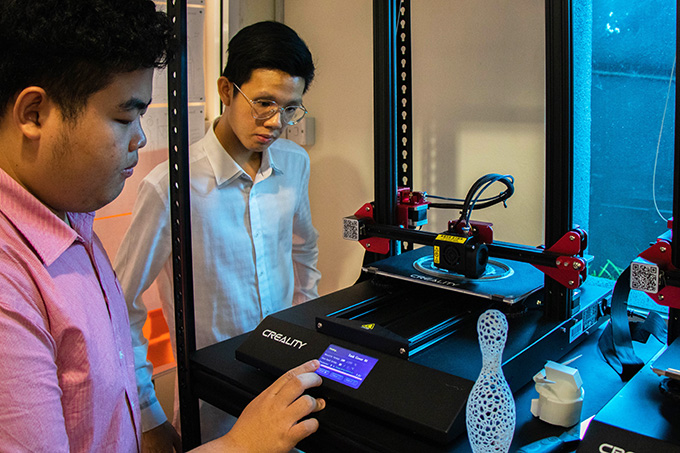 |
CLAY MODELLING WORKSHOP
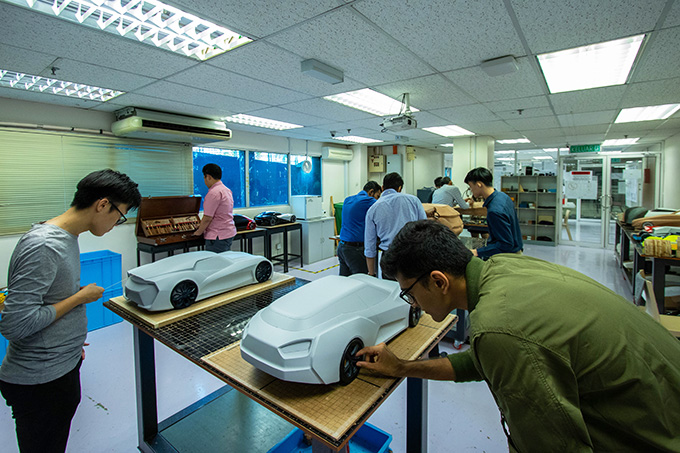 | 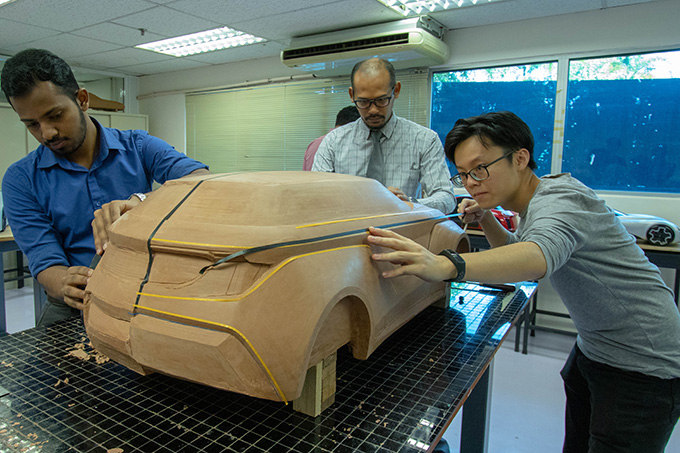 |
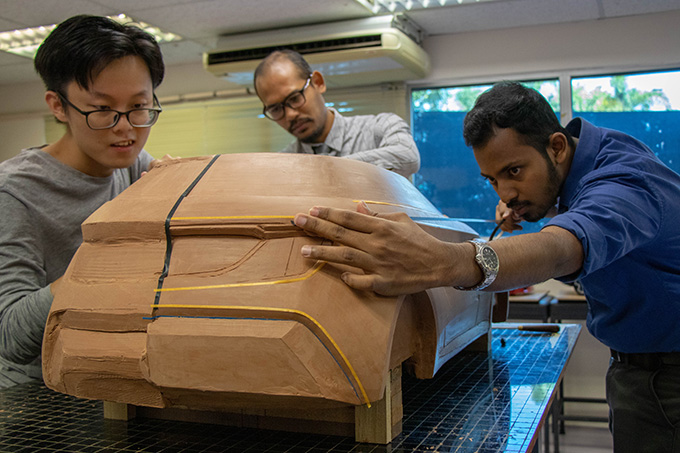 | 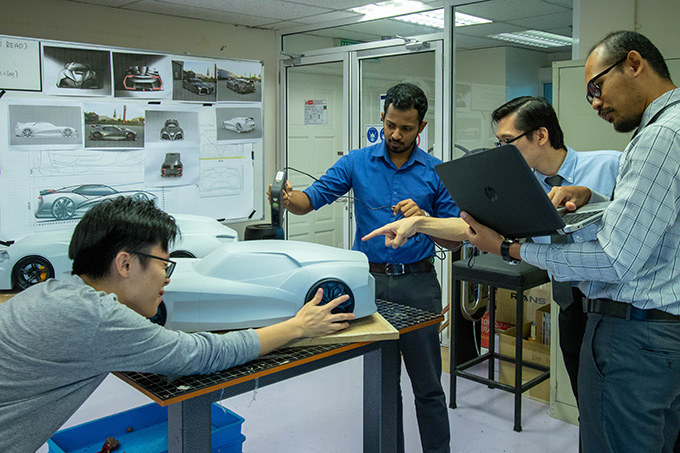 |
INDUSTRIAL DESIGN WORKSHOP
| ||
| | |
SKETCHING WORKSHOP
| |
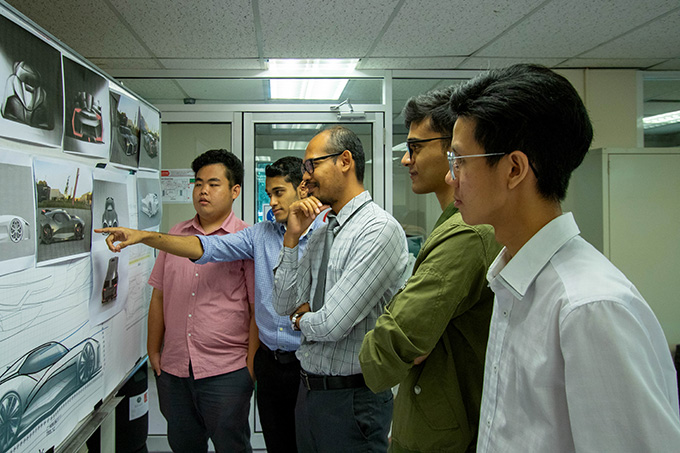 | 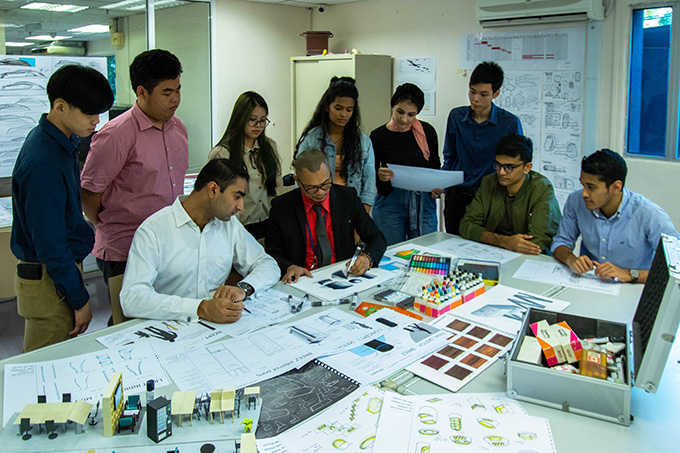 |
CAREER OPTIONS
|
|
COURSE FEES
Malaysian Students | International Students |
Year 1: RM 32,900 | Year 1: RM 33,600 (USD 7,815) |
* Fees stated here do not include Deposits and other Miscellaneous Fees. Please refer to Fee Guide for details.
MQA ACCREDITATION
(R/0212/6/0005)(07/29)(MQA/FA11898) |
| All information is correct at the time of publication, but is subject to change in the interest of continuing improvement. |
Design, Advertising & Animation Programmes |



